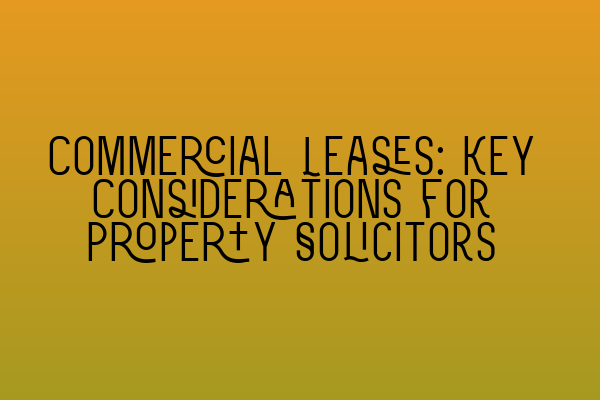Commercial Leases: Key Considerations for Property Solicitors
As a property solicitor, understanding the intricacies of commercial leases is crucial to providing effective advice and guidance to your clients. Commercial leases are legally binding contracts that govern the relationship between a landlord and tenant in a commercial property. Whether you are acting for the landlord or the tenant, there are several key considerations to keep in mind when dealing with commercial leases.
1. Lease Terms and Conditions
The terms and conditions of a commercial lease outline the rights and obligations of both the landlord and the tenant. It is essential to carefully review these terms to ensure that they align with your client’s goals and objectives. This includes considering the duration of the lease, rent payment terms, permissible use of the property, and any restrictions or covenants that may be applicable.
For mock exam practice questions for SQE 1, click here.
2. Rent and Service Charge
One of the primary considerations in any commercial lease is the rent and service charge. This includes determining the amount of rent payable, frequency of payments, and any provisions for rent reviews. It is important to assess whether the rent provisions are fair and reasonable for both parties. Additionally, understanding the service charge provisions and any potential adjustments is crucial in ensuring that your client is not burdened with excessive costs.
For practice mocks for SQE 1 (FLK1 and FLK2), visit here.
3. Repair and Maintenance Obligations
Commercial leases typically include provisions related to the repair and maintenance of the property. These obligations may fall on either the landlord or the tenant, depending on the agreed terms. It is important to carefully review these provisions and assess the potential costs and responsibilities associated with them. Understanding who is responsible for major repairs, structural issues, and general maintenance will help your client avoid any unforeseen expenses.
4. Break Clauses and Renewals
Break clauses and lease renewals are important considerations for both landlords and tenants. Break clauses allow for the termination of the lease before the agreed term expires, while lease renewals provide the opportunity to extend the lease once it reaches its expiration. It is crucial to carefully review and negotiate these clauses to ensure that they align with your client’s best interests and provide flexibility in their lease agreement.
5. Assignment and Subletting
Assignment and subletting provisions stipulate whether a tenant can transfer their lease or sublet the property to another party. These provisions can have significant implications for both landlords and tenants. It is important to consider the terms and restrictions placed on assignment and subletting to avoid any potential disputes or breaches of the lease agreement.
For comprehensive SQE 2 preparation courses, visit here.
6. Termination and Dilapidations
Understanding the termination provisions of a commercial lease is crucial for both landlords and tenants. These provisions outline the circumstances under which the lease can be terminated and the obligations and liabilities that arise upon termination. Dilapidations refer to the repairs and refurbishments that a tenant may be required to undertake upon vacating the property. It is important to assess these potential costs and negotiate favorable terms for your client.
7. Legislation and Compliance
Commercial leases are subject to various legislation and regulations to ensure fairness and compliance. Some important legislation to consider includes the Landlord and Tenant Act 1954, Energy Performance Certificate (EPC) requirements, and health and safety regulations. Staying up-to-date with these legal requirements is essential to protect your client’s interests and avoid any potential legal disputes.
Need help with SQE 1 preparation? Check out our comprehensive courses here.
Conclusion
Commercial leases can be complex and demand careful consideration from property solicitors. By focusing on these key considerations, you can provide your clients with the best possible advice and ensure that their commercial lease agreements are fair, reasonable, and align with their needs. Staying informed about relevant legislation, understanding the lease terms and conditions, and negotiating favorable provisions are essential in effectively representing your clients in commercial lease transactions.
For information on SRA SQE exam dates, visit here.
